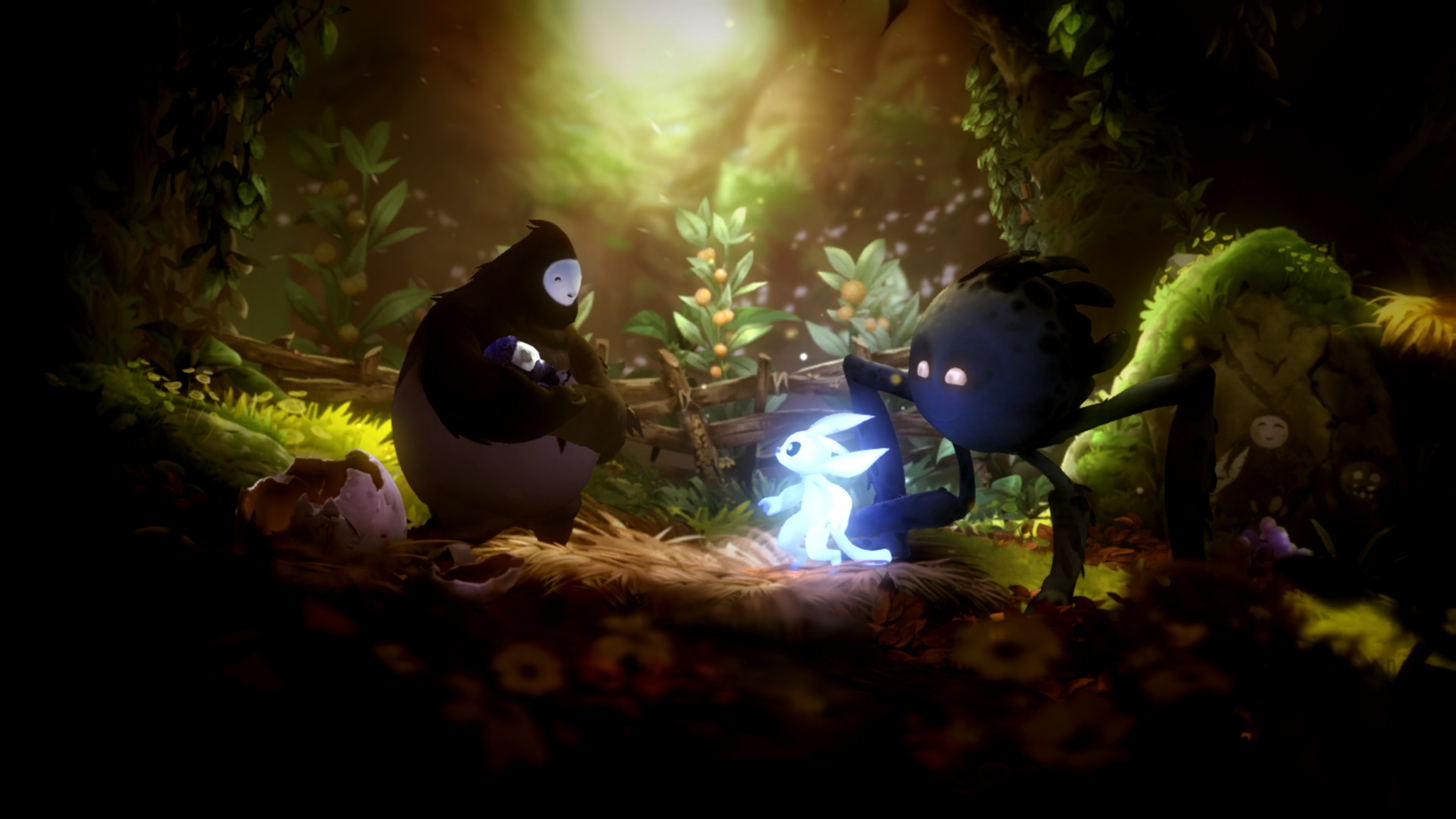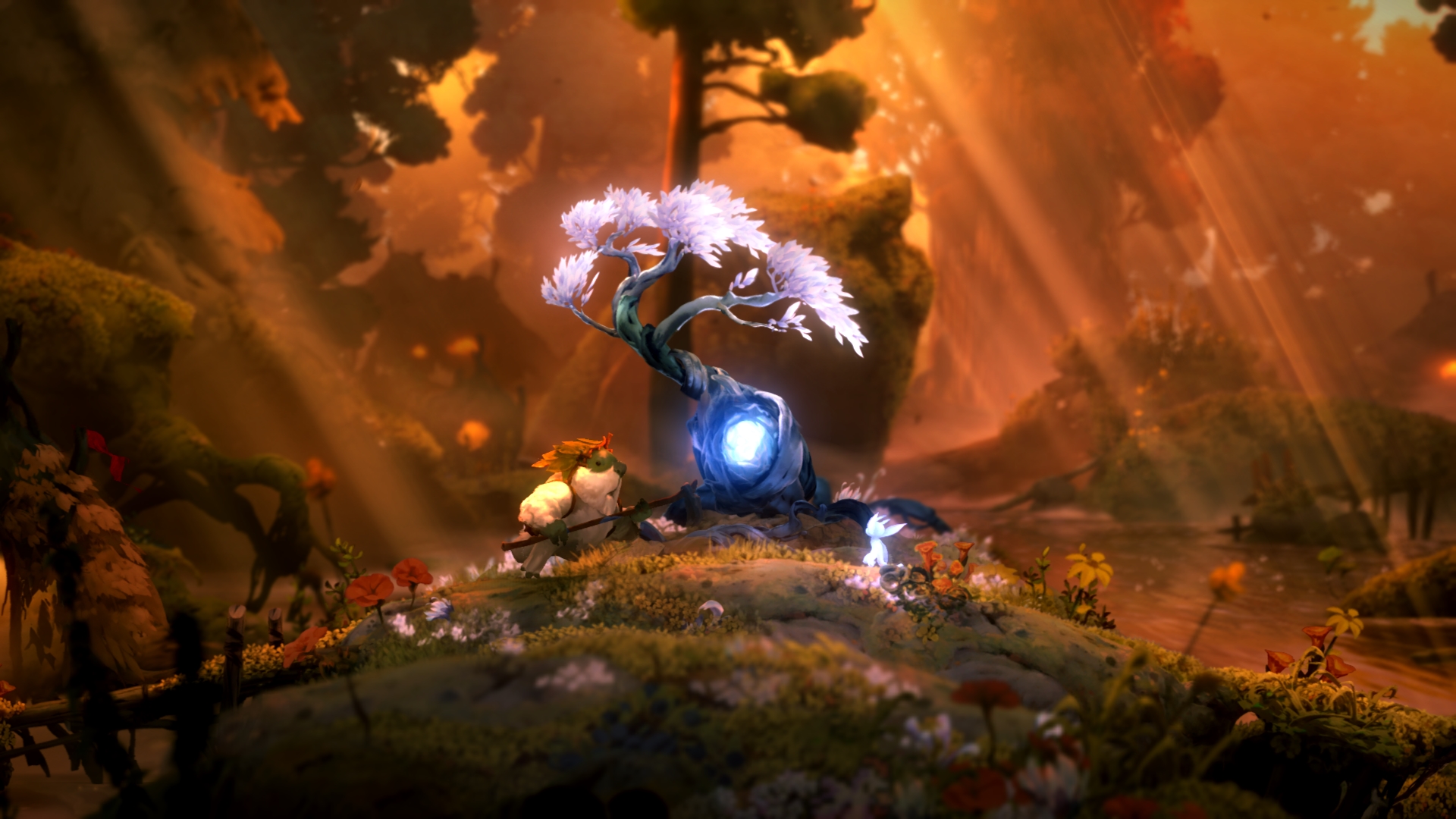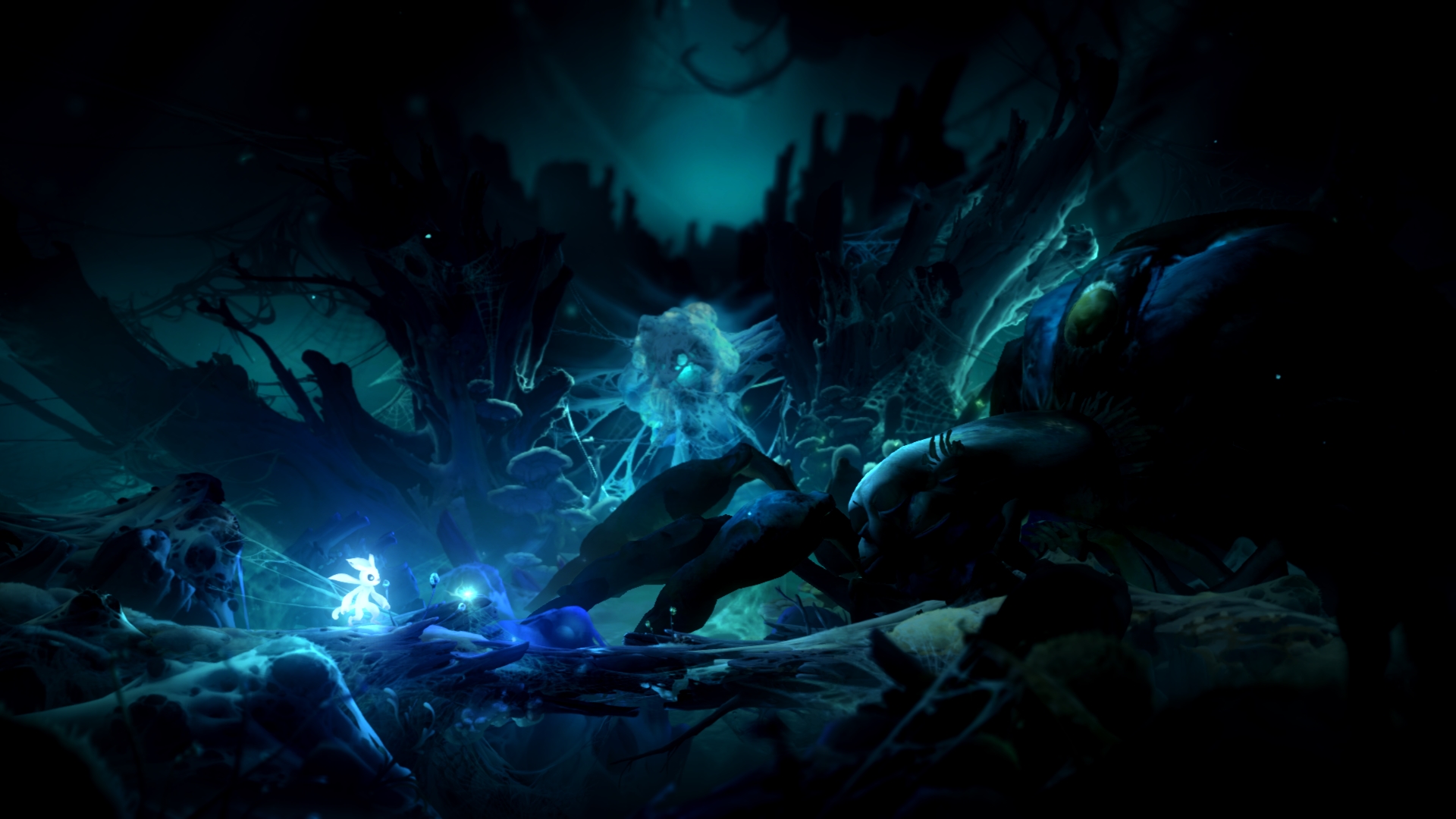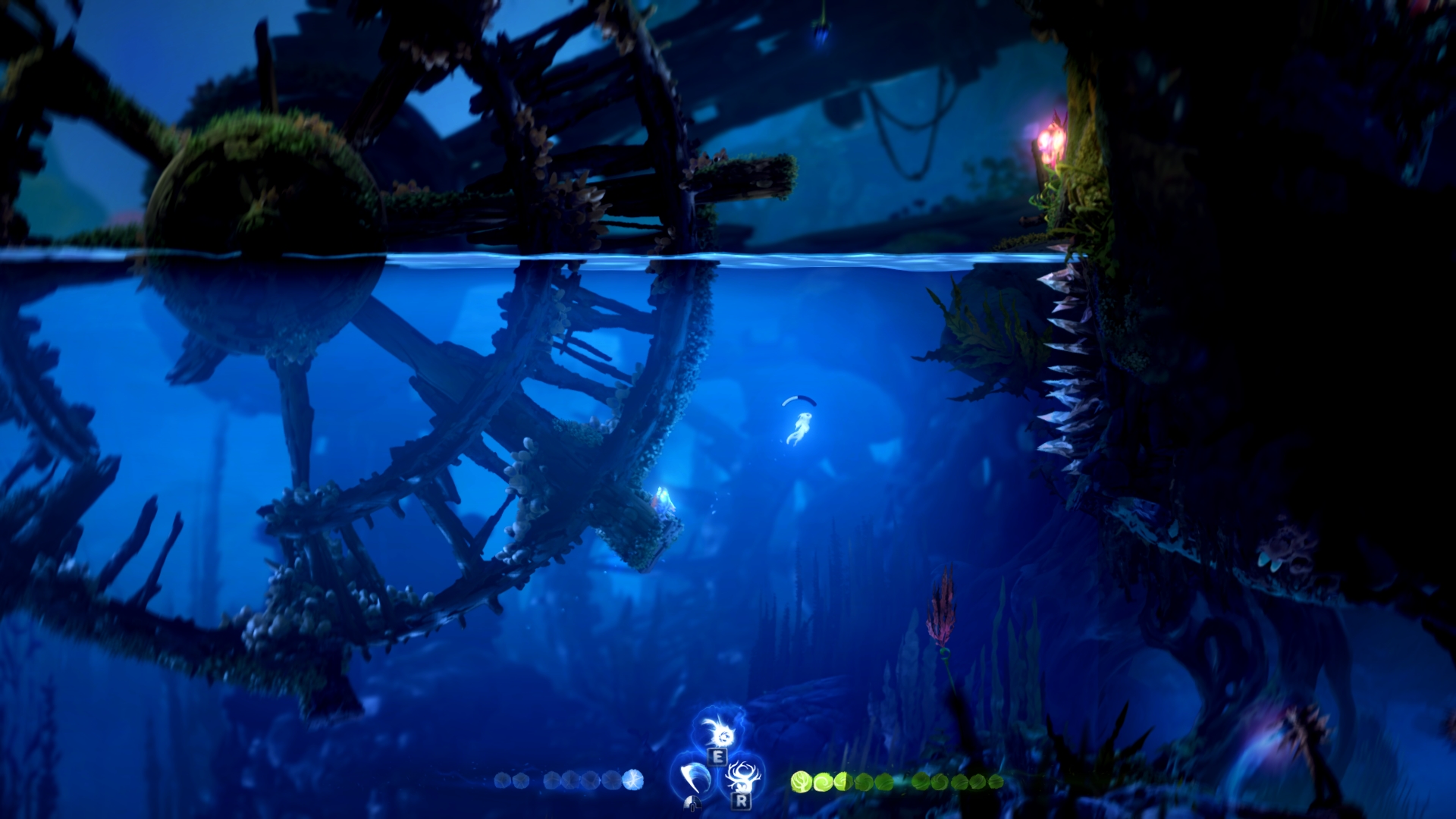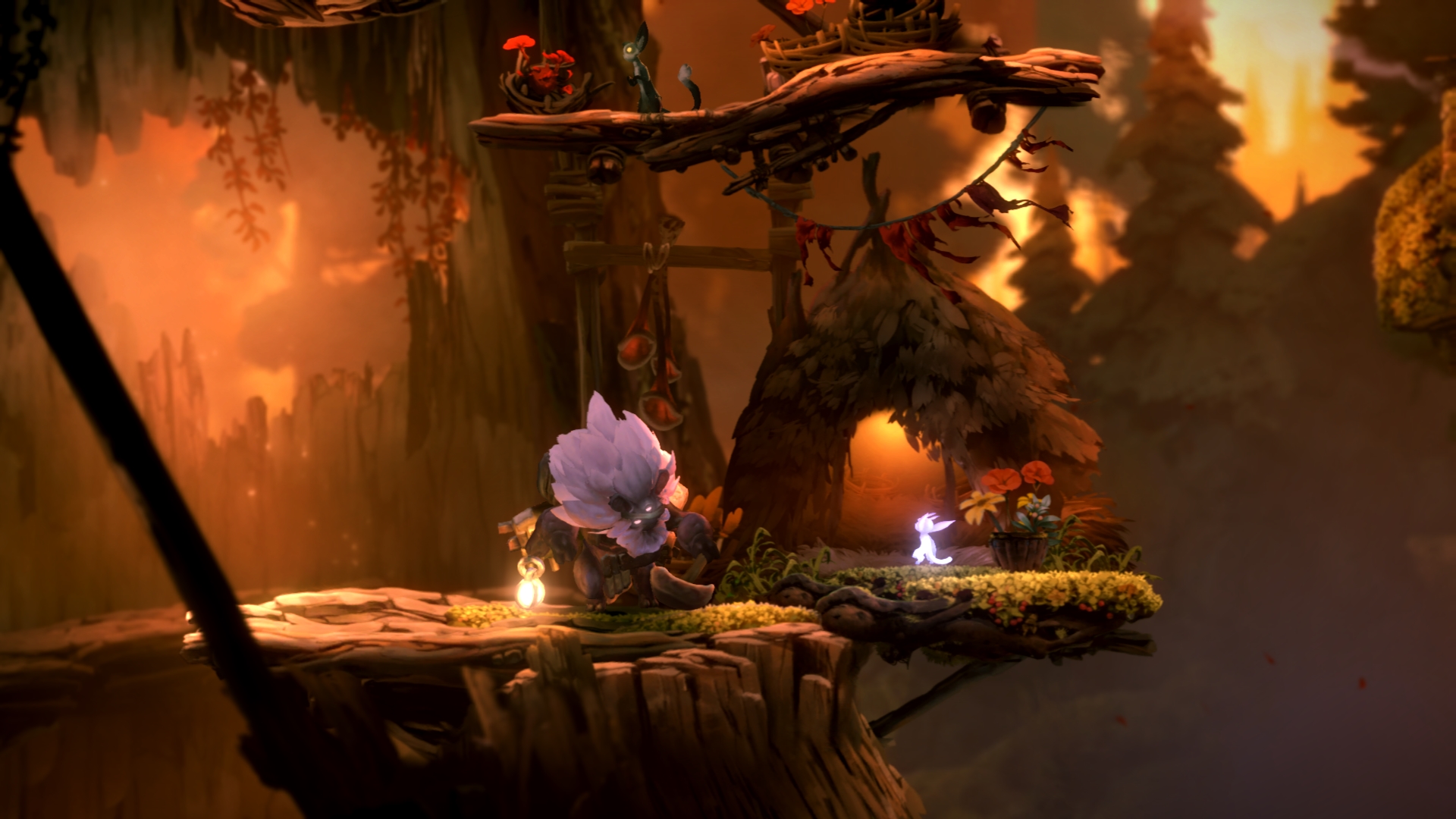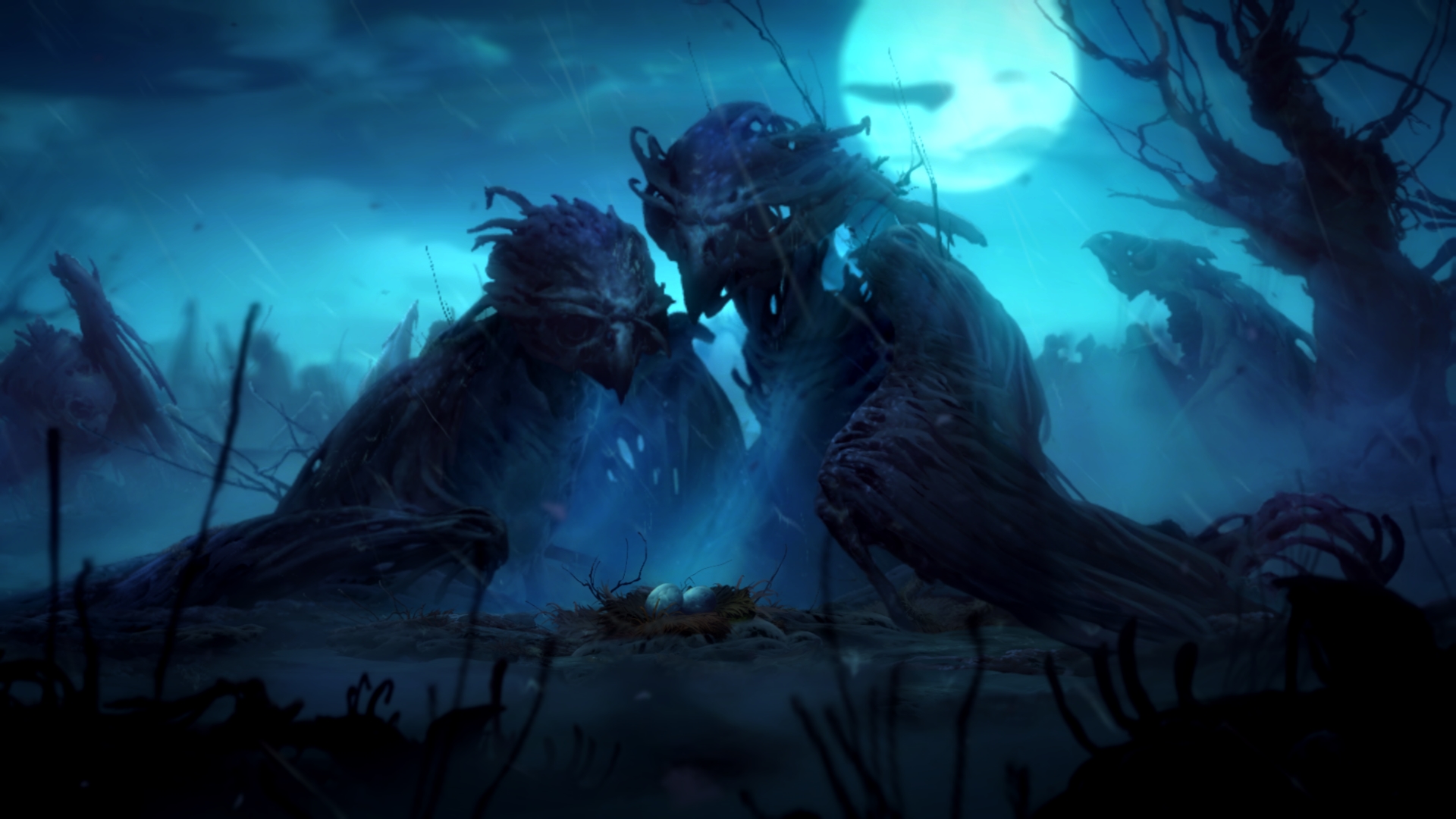The most immediately arresting thing about this floaty, oboe-heavy platformer, the sequel to 2015’s darling Ori And The Blind Forest, is its art style. Ori is mesmerizingly pretty, to the extent where, after having played for far too many hours on end, and seeing a big skulky wolf in the background, I actually tried to call my dog over to look at the screen, because nobody else was home to admire it. Obviously he didn’t care, because he was a dog. But I was too visually engrossed to register that. I was engrossed, in fact, right from the prologue, which is Renaissance-tier beautiful. It’s a bit slow, sure, and you can skip it if you want, but I’d consider that heathenry: watching the motherly Naru, who looks a bit like Disney’s Big Hero 6 mixed with a panda, dote on little Ku (who hatches from the egg of the first game’s giant owl monster, Kuro) is more than worthy of a little patience. But then - oh no! - Ku and Ori get separated. And so, of course, you must embark on an odyssey to rescue your pal from the dark and scary world they’ve been plunged into.
Said odyssey plays out as a platformer (or a Metroidvania, if you must) and its obstacle-coursing is remarkably versatile: not only does it offer you a huge array of options for airborne gallivanting, it remains receptive to whichever combination of them you choose to go with. Your aerial maneuvers start off as easy wall-jumps, but eventually become part of a system of puzzles encompassing more kinds of movement than I knew existed. You’re swimming? Fine. What you need to do is propel yourself upwards, allowing you to get some proper bottlenose-dolphin-level airtime, and then at the apex of your jump, dash to the left, burrow into the wall, speed through it like an industrial drill, grapple onto this weird blue thing and then kick yourself off a lantern to land just there. Oh, and also, there’ll be an absolutely massive worm with demogorgon teeth chasing you the whole time.
As you can probably imagine, situations like this are both tense and difficult. But - and I know it’s cliche to praise a platformer by saying it “feels fair” - they always… feel fair. Ori always gives you a chance, and then some, and you’ll never die because the environments are poorly structured. This overall thoughtfulness extends to Ori’s other aspects, too - such as its combat. But before going into that, a brief word on your opponents, who are brilliantly abominable. They’re a fresh, more-inspired version of your classic “what would normal animals look like if they were criss-crossed,” principle, including monkeys with lion manes and metal shields in one case, and small, sleek panthers that are also blue tree monitors in another. They’re grand. But don’t even get me started on the horrible, Raymanly bird-bees.
You fend off these ragtag beasts with spirit weapons (because you’re a spirit, aren’t you?). You’ve got a white-silvery bow that, later in the game, upgrades to fire splinter shots at multiple enemies, as well as a spirit spear that’s mad powerful, but exhausting for poor little Ori to throw. There are also, perhaps unsurprisingly, magical spirit abilities as well: you can emit a spherical burst of white fire to deal solid area-of-effect damage, or sacrifice offence for defence with a handy regeneration ability. There’s a lot of room for on-the-fly switching, as well, which means that particularly tough scraps, like the boss fights, allow for a lot of versatility in terms of approach. On the subject of boss fights, Ori’s are good. Most of them begin with you running away from the boss-to-be, who usually annihilates the platforms you were legging it across two seconds ago, as you side-scroll your way to the inevitable theatre of knocks. The best thing about these small, contained arenas is the well-calibrated, non-intrusive incorporation of platforming elements. It’s not one of those games with eight different levels to jump between while you’re also trying to focus on the big baddie in front of you. You can platform if you want, bouncing off the walls and grapple-hooking over the boss’s head, but you’re not bullied into it.
You can play out a relatively straightforward fight instead, balancing dodges on the ground with one or two hits here and there, sneakily rolling under a big spider’s pincers, or jumping over an amphibious tongue as if it were a big swampy skipping rope. Or you can go in guns blazing, and smack the Ori equivalent of the Dark Souls dog with a fire stick. Obviously, you’ve always got the option to get fancy if you want, and you’ll probably end up wrecking the boss much faster if you do. But it’s your choice. Ori caters to multiple styles of play, particularly in these fights: you’ve always got a range of strategies available to you, and victory doesn’t always boil down to who’s the biggest show-off. I had some first-hand experience with how this all creates the phenomenon of replayability, because Ori crashed on me twice. The first time swallowed four hours of progress, and I lost another three in the second. And although I didn’t appreciate this, I have to admit I enjoyed those hours way more the second time around. I was at least twice as fast, apart from anything else, and there were more of the moments of massive satisfaction that come from executing perfect platforming. These moments feel particularly fast and precise, and that emphatic sense of getting it right is something Ori accomplishes with real finesse.
The controls feel consistently lithe, which is impressive given how many sinewy, potentially clashing mobility systems are in play at any given time, and that the environmental design provides an omni-directional playground for your triple-jumping, grapple-slinging spirit lad. At times it feels as if you’re vicariously playing through a cluster of iron filings, with each prospective springboard acting as a magnet for you to cling to - if you can get close enough to them, that is. There’s one platforming sequence towards the end (which I won’t spoil) that’s probably one of the best and most fast-paced side-scrolling sections I’ve ever seen. When I eventually beat it, after maybe 25 deaths, my shoulders were stiff because of the angle I had my hand hovering over WASD at. I had to have a glass of water to cool down. There were times I thought the platforming was a bit… persnickety? But in hindsight, I can honestly say I was just getting annoyed at how tough it was. But it’s tough to stay annoyed at Ori, too. Because you’re endlessly being charmed by scary-looking spidery fellows like Gumo who are actually really smiley and sound, or the guy who wants you to unfreeze a lake so he can make some fish soup for everybody. In fact, for a world that’s apparently been drowned in a deluge of darkness induced by Shriek (a big skull-bird with T-rex arms and what I can only describe as shoulder-legs), everybody is infectiously lovely. There’s even one person who is undyingly devoted to growing a little garden. “The Decay? Never heard of it, but please bring me some seeds”.
As well as the crashes, I also had some issues with stuttering visuals on one occasion, and experienced a glitch in the last dungeon which meant I no longer took damage. Despite my becoming invincible, the game then crashed a third time (although I only lost about 15 minutes of progress then), and I had to get used to being hit in the face with purple laser beams all over again. So, yes: there are quite a few performance and tech issues impeding Ori at the moment, but I would hope they’re easily smoothed out. The Xbox version is getting a day one patch, so I’m not too worried for the long term future of the PC release. And presuming these techy mishaps are rectified, Ori And The Will Of The Wisps is one of the most charming, engaging, visually striking and emotionally touching games I’ve played in a long time. It’s difficult but fair, complex but intuitive, and gruelling but conquerable. It’s a game in which you are the light illuminating the world - literally, as Ori’s glow acts as a constant visual centrepiece, defining the darkness, and working with the colour palette, in each and every environment. And when I eventually recognised and realised the titular Will Of The Wisps, I almost immediately decided to plunge the world into eternal darkness for a second time, just so I could save it all over again. I know that sounds mad, little Moki, but trust me. I’ll save it quicker this time.
